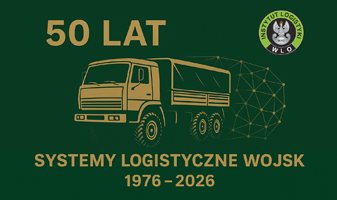ARTYKUŁ ORYGINALNY
MARKOV MODEL OF THE ASSESSMENT OF THE USE OF TRANSPORT MEASURES IN A DISTRIBUTION COMPANY
1
Wojskowa Akademia Techniczna, Wydział Bezpieczeństwa, Logistyki Zarządzania, Instytut Logistyki
Data publikacji: 30-06-2019
SLW 2019;50(1):165-178
SŁOWA KLUCZOWE
STRESZCZENIE
In distribution companies, it is particularly important to organize transport processes properly and minimize unnecessary mileage. A high level of readiness of transport means is also required, which guarantees the execution of every order. It enables to achieve rational fleet management, compliance with service intervals and an even workload. The use of transport means is also influenced by the way a company is managed and decisions made at the strategic level. This article shows how the choices made by the management board regarding trade partners (manufacturers) influenced the degree and legitimacy of owned rolling stock use. For this purpose, two different business steps were compared. Markov’s processes were used in the study.
REFERENCJE (28)
1.
BĘDKOWSKI, L., & DĄBROWSKI, T. (2000). Podstawy eksploatacji, część I Podstawy diagnostyki technicznej. WAT.
2.
BOBROWSKI, D. (1985). Modele i metody matematyczne teorii niezawodności w przykładach i zadaniach. Wydawnictwa Naukowo-Techniczne.
3.
BOGROŃ J., JAŹWIŃSKI J., SIKORSKI M., WAŻYŃSKA-FIOK K., (1982). Niezawodność statków powietrznych. ITWL.
4.
BORUCKA, A. (2013). Funkcjonowanie wojskowych oddziałów gospodarczych w nowym systemie logistycznym sił zbrojnych. Logistyka, 6, 39-48.
5.
BORUCKA, A. (2014). Przewóz osób w Polsce w świetle zmian legislacyjnych. Logistyka, 6, 468-475.
6.
BORUCKA, A. (2018). Forecasting of fire risk with regard to readiness of rescue and fire-fighting vehicles. Interdisciplinary Management Research XIV’, Croatia, 397-395.
7.
BORUCKA, A. (2018). Markov models in the analysis of the operation process of transport means. In Proceedings of the ICTTE International Journal For Traffic And Transport Engineering Conference, Belgrad (pp. 1073-1082).
8.
BORUCKA, A. (2018). Model of the operation process of aircraft in the transport system. In Proceedings of the ICTTE International Journal For Traffic And Transport Engineering Conference, Serbia (pp. 22-30).
9.
BORUCKA, A. (2018). Risk Analysis of Accidents in Poland Based on ARIMA Model. Transport Means, 162-166.
10.
BORUCKA, A. (2018). Three-state Markov model of using transport means. Business Logistics In Modern Management, 3-19.
11.
BORUCKA, A., & MIKOSZ, B. (2008). Organizacja gospodarki odpadami w siłach zbrojnych na tle zmian militarnych i nowych wyzwań stawianych polskiej armii. Archiwum Gospodarki Odpadami i Ochrony Środowiska, 8, 1-12.
12.
BORUCKA, A., & MITKOW, S. (2018). Mathematical model of travel times related to a transport congestion: an example of the capital city of Poland–Warsaw. Business Logistics In Modern Management, 501-526.
13.
BORUCKA, A., & WIELGOSIK, M. (2016). Istota i znaczenie służby przygotowawczej i szkolenia rezerw. Systemy Logistyczne Wojsk, (45), 51-66.
14.
DECEWICZ, A. (2011). Probabilistyczne modele badań operacyjnych. Oficyna Wydawnicza-Szkoła Główna Handlowa.
15.
FILIPOWICZ, B. (1996). Modele stochastyczne w badaniach operacyjnych: analiza i synteza systemów obsługi i sieci kolejkowych. Wydawnictwa Naukowo-Techniczne.
16.
GIRTLER, J., ŚLĘZAK, M. (2012). Application of the theory of semi-Markov processes to the development of a reliability model of an automotive vehicle. Archiwum Motoryzacji, 2, 49–58.
17.
GRABSKI, F., & JAŹWIŃSKI, J. (2009). Funkcje o losowych argumentach w zagadnieniach niezawodności, bezpieczeństwa i logistyki. Wydawnictwa Komunikacji i Łączności.
18.
IWANIK, A., & MISIEWICZ, J. K. (2015). Wykłady z procesów stochastycznych z zadaniami. Część pierwsza: Procesy Markowa, SCRIPT, Warszawa.
19.
KAŁUSKI, J. (2007). Wykłady z procesów Markowa. Wydawnictwo Politechniki Śląskiej.
20.
KOŹNIEWSKA, I., & WŁODARCZYK, M. (1978). Modele odnowy, niezawodności i masowej obsługi. PWN, Warszawa, 335.
21.
ORZEŁOWSKI, S. (2009). Naprawa i obsługa pojazdów samochodowych. Wydawnictwa Szkolne i Pedagogiczne.
22.
SKOCZYŃSKI, P., ŚWIDERSKI, A., & BORUCKA, A. (2018). Characteristics and Assessment of the Road Safety Level in Poland with Multiple Regression Model, Transport Means. In Proceedings of the 22nd International Scientific Conference part I, Lithuania (pp. 92-97).
23.
ŚWIDERSKI, A., & BORUCKA, A. (2018). Mathematical Analysis of Factors Affecting the Road Safety in Selected Polish Region, Transport Means. In Proceedings of the 22nd International Scientific Conference part II, Lithuania (pp. 651-654).
24.
ŚWIDERSKI, A., BORUCKA, A., JACYNA-GOŁDA, I., & SZCZEPAŃSKI, E. (2019). Wear of brake system components in various operating conditions of vehicle in the transport company. Eksploatacja i Niezawodność, 21, 1-9. dx.doi.org/10.17531/ein.2019.1.1
25.
WAŚNIEWSKI, T., & BORUCKA, A. (2011). Sieciowe rozwiązania w łańcuchu dostaw w oparciu o technologię radiowej identyfikacji towarów. Systemy Logistyczne Wojsk, (37), 235-245.
26.
WOROPAY, M., MIGAWA, K., & ŻUREK, J. (2003). Model oceny i kształtowania gotowości operacyjnej podsystemu utrzymania ruchu w systemie transportowym. Wydaw. i Zakład Poligrafii Instytutu Technologii Eksploatacji.
27.
ŻÓŁTOWSKI, B., & NIZIŃSKI, S. (2002). Modelowanie procesów eksploatacji maszyn. Wydaw. Markar.
28.
ŻUREK, J., ZIÓŁKOWSKI, J., & BORUCKA, A. (2017). Application of Markov processes to the method for analysis of combat vehicle operation in the aspect of their availability and readiness. Safety and Reliability. Theory and Applications, ESREL, 2343-2352.
Udostępnij
Przetwarzamy dane osobowe zbierane podczas odwiedzania serwisu. Realizacja funkcji pozyskiwania informacji o użytkownikach i ich zachowaniu odbywa się poprzez dobrowolnie wprowadzone w formularzach informacje oraz zapisywanie w urządzeniach końcowych plików cookies (tzw. ciasteczka). Dane, w tym pliki cookies, wykorzystywane są w celu realizacji usług, zapewnienia wygodnego korzystania ze strony oraz w celu monitorowania ruchu zgodnie z Polityką prywatności. Dane są także zbierane i przetwarzane przez narzędzie Google Analytics (więcej).
Możesz zmienić ustawienia cookies w swojej przeglądarce. Ograniczenie stosowania plików cookies w konfiguracji przeglądarki może wpłynąć na niektóre funkcjonalności dostępne na stronie.
Możesz zmienić ustawienia cookies w swojej przeglądarce. Ograniczenie stosowania plików cookies w konfiguracji przeglądarki może wpłynąć na niektóre funkcjonalności dostępne na stronie.


